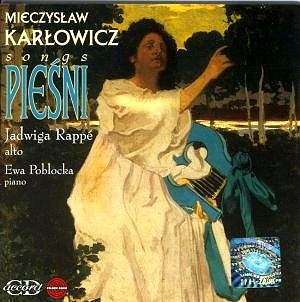Karłowicz
is best known as a composer of a handful of late-romantic nationalist
orchestral works with psychological depth replacing folk simplicity.
These twenty-two songs are his complete production in the genre.
They show another facet of his Polish soul. These are still late-romantic
but here the order of the day is brevity; the composer must compress
his message at quintessential level. No doubt being the son of
a leading linguist helped his feeling for words.
The
songs lie between the tropics of Rachmaninov and Sibelius with
subsidiary voices from Tchaikovsky (as in Karłowicz’s striking
violin concerto), Chopin and Grieg. Although the piano parts are
not as complex the similarities with the Rachmaninov songs are
often quite noticeable. Among the twenty-two songs I would single
out the ringing piano line superbly handled by Pobłocka in
I remember quiet clear golden days. Asleep in the splendours
of the night commands attention with its evocative portrayal
of haunted sunken realms. In the calm of the evening the
rustlingly troubled piano part of speaks of the depths - de profundis
indeed. However it is not all atmosphere. Listen to My soul
is sad which at 1.25 rises to convincing climax. It goes over
the fields is like a troubadour serenade - positive yet not without
irresistible Tchaikovskian melancholy as in Tatiana’s Letter
Scene from Eugene Onegin.
Rappé
has a Ferrier-like ebony in her voice. You will certainly want
to catch her recital if she appears in your area. Ewa Pobłocka
has also set down for Accord a collection of piano concertos by
Panufnik, Lutosławski and Szymański (ACD046-2). In the
songs she provides unselfish support. The tape originates from
Polish Radio in 1996.
The
bilingual booklet is well detailed with a notably thoughtful essay
by Bohdan Pociej. The texts sung in Polish are printed in the
booklet in their original language and English translation. The
fluent-sounding translation (not to be taken for granted) is by
Michał Kubicki.
This
disc has been around since 1999 but sadly no-one has paid it much
heed. The playing time is undeniably short. Its appeal is likely
to be strongest to collectors of East European art-song - especially
to those already well disposed to the songs of Tchaikovsky, Sibelius
and Rachmaninov. Essential listening in that case also if you
have the Chandos collection of tone poems and want to know how
the composer fared in the recital room.
Rob
Barnett
MusicWeb
is now selling the CDAccord catalogue

![]() for
details
for
details